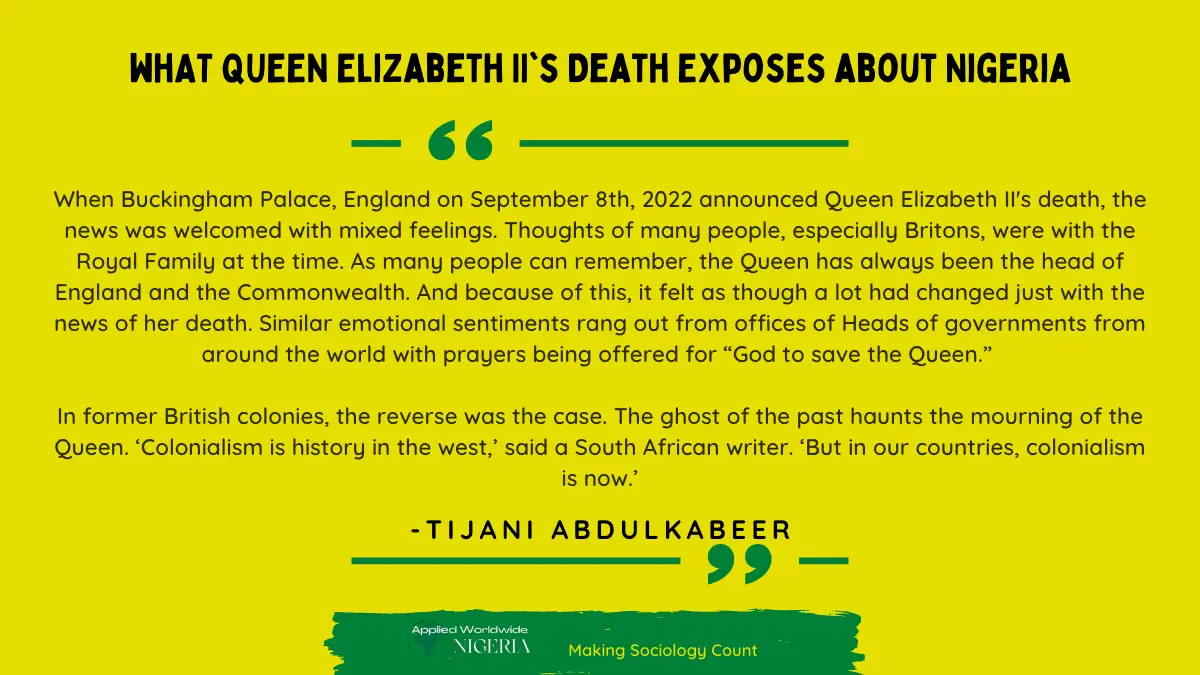When Buckingham Palace, England on September 8th, 2022 announced Queen Elizabeth II’s death, the news was welcomed with mixed feelings. Thoughts of many people, especially Britons, were with the Royal Family at the time. As many people can remember, the Queen has always been the head of England and the Commonwealth. And because of this, it felt as though a lot had changed just with the news of her death. Similar emotional sentiments rang out from offices of Heads of governments from around the world with prayers being offered for “God to save the Queen.”

In former British colonies, the reverse was the case. The ghost of the past haunts the mourning of the Queen. ‘Colonialism is history in the west,’ said a South African writer. ‘But in our countries, colonialism is now.’
In Nigeria, one of the British colonies, this spectrum of feelings started with a tweet from Uju Anya, a Professor of Nigerian descent. Who recalled Britain’s role in the Nigerian civil war. The death toll was not documented; it is estimated that about one to three million people, mostly from the Igbo tribe in the eastern part of the country, were killed. Anya resolved that the Queen was not worthy of empathy. Instead, she wished the Queen the worst outcome of the uncertainty doctors ventilated about her health situation.
With oozed bitterness, many others also find it difficult to celebrate the Queen’s life — in part because they feel she should be held accountable for what her country did.
At the time of her death, many Nigerians reflected on the darker part of the British legacy. They reflected on the era of transatlantic trade, the Berlin Conference, where Africa’s partitioning occurred in 1885. The amalgamation which occurred 12 years before the late Queen’s birth, the civil war and how Britain played a major role in these events which shaped much of Nigeria’s history.
For many, she can’t be separated from colonial rule. Even while the President of Nigeria and other dignitaries offered tributes and condolences, they were not speaking for the entire Nigerian population. As many others, including Anya, were interrogating the perceptions of their own realities, engaging in fraught discussions about the extent of Queen Elizabeth, whose duties were largely ceremonial and the unfinished colonial business on the continent.
The place of the late monarch in history
Now that the Queen is dead, Britain faces questions and uncertainty. The reason is not far-fetched. When Elizabeth took the throne in 1952, more than a quarter of the world’s population was under British imperial power. That was more than 700 million people — including in parts of Africa, Asia, the Middle East, and the Pacific islands.
This memory of Elizabeth is complicated by the fact that even after the decline of the United Kingdom’s global influence, in former colonies, the scars of colonialism lingered. In Nigeria, the Igbos who are victims of the 30-month civil war ignited by a series of unfortunate events are quick to remind you about the alleged role of the British government during the war.
To them, as Anya tweeted, Elizabeth “supervised a government that sponsored the genocide that massacred and displaced half my family and the consequences of which those alive today are still trying to overcome.’ Now 50 years after the end of the war, they maintain that she represents a mistake that should never have happened.
Though, as a Nigerian myself, it would also be impossible to deny the devastating effects of the horrors of the civil war in global history on countries and people of the world. But there is the quick question of whether the Queen as the monarch could have influenced the policies churned out during that era.
Going by history, Winston Churchill was the United Kingdom Prime Minister for the second time between 1951-1955. Anthony Eden took over from 1955-1957. Harold Wilson was elected twice from 1964-1976. For context, these individuals headed the government of Britain around the time that the bloody civil war took place in Nigeria. So, based on the reality of the situation, one thing is clear; the Queen who has now died is only just the head of state. And the British government should be blamed for the apparent silence just as the United Nations and not just the monarch should be called out.
We might find it difficult to separate the Queen from the institution and its history but not to excuse the evil that men do, pre-colonial Africa is also guilty of slavery and colonialism like our colonizers. The urge to expand territories and control weaker communities led to various social, economic, and political factors that inspired hostilities.
Reminding Nigerians that slave trade, for instance, ended 155 years ago. Nigeria, like many other colonies, gained independence about sixty years ago, and so, it would be possibly insufficient to still suggest that the Queen is our problem. “Given that many other countries with a history of colonization have broken the chains of underdevelopment, even surpassing the United Kingdom in some ways. Some Nigerians blame the British for supporting the civil war that caused the deaths of millions of Nigerians but whom do we blame for the current violence all over the country? Said Niran Adedokun, a lawyer and journalist.
A report published by The PUNCH in June this year shows that 3,478 people died in violent attacks, with 2,256 others abducted across the country between December 2021 and June 15, 2022. Yet, the self-centeredness of our leaders is unparalleled. Businesses are not spared from the rod. Also, poverty is on an aggressive increase. By now, the $1.90 poverty line, like a law student said, has become the roof under which the majority of the populace now effortlessly lives.
As though this is not enough, safety has been erased from our lexicon. Insecurity of lives has grown to become a daily routine. We have all the possible indices to no small degree but — Again! — who do we blame for these challenges?
THE NIGERIA’S PROBLEM OF DEVELOPMENT
“The world is a brutal place. People are crazy wild across races, across land borders. If the colonized had the same advantage the colonizers had, they likely would’ve taken the same decisions. If the enslaved had enough power, they might’ve been on the other side of history.
“Not to excuse the evil that men do. People should be held accountable for their actions. But let’s not paint the world like it’s divided into good and bad, oppressor and victim, and that this division is as clear as night and day,” said Kunle Adebajo, head of investigations at HumAngle media.
This stood out following the assortment of sentiments that followed Uju Anya’s tweet about the late Queen. And it is a fair judgment. We dwell too much on the past. In classes, for those studying history, you are taught with the sentiments that our colonizers are evil and you are expected to hate them in full. Most of the time, like Adebajo, further said, “you miss out on the vast opportunities of the present.
According to a recent report by the World Bank, seven years after Singapore gained independence in 1965, they were confronted with severe unemployment, poor infrastructure, and a housing shortage. But today, not only is their GDP per capita significantly higher than that of the United Kingdom but the city-state is also ranked as one of the most livable cities, boasting one the highest levels of human capital development in the world.
This is a former colony like Nigeria making waves. But by the day, more and more Nigerians still don’t seem to get it. We have failed to realize that our problem is that we lack visionary leadership that has failed to maximize available resources for our development. They believe that they are too powerful to be dealt with simply because they have both financial and political muscle.
Today in Nigeria, there is neither a job for graduates nor food for the common man. This has created many hopeless individuals who now look towards crime as a resort. Businesses are also not spared from the rod. Our business owners are crippled by poor infrastructure, alongside stifling taxes and terrible economic policies while terror activities keep rising in the country. The problem remains fertile, and over the years, they keep recycling them as empty political promises.
The way out for Nigeria is to first stop playing the blame card; we need to stop shouting about how we were victims of colonialism and embrace the local challenges like how our leaders loot the nation blind. Or how the hardship imposed by them forbids many Nigerians to reach their full potential, the caste systems in place that have shattered our infrastructures, stunt our institutions, and the refusal of the Nigerian people to stop dwelling on the atrocities of the past as our greatest problems.







